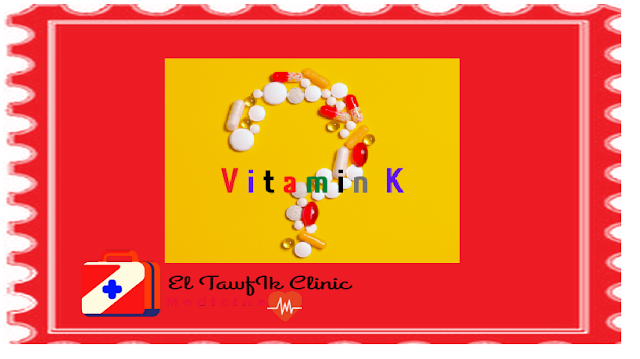Vitamin K deficiency
Introduction
Vitamin K deficiency is rare because the normal
bacteria in the intestine produce it in sufficient quantities, but there may be
a deficiency due to taking antibiotics that kill these bacteria, or due to the
presence of diseases in the intestines and digestive systems such as bile
diseases, pancreatic diseases, and severe diarrhea.
Reasons for Vitamin K deficiency
Vitamin K deficiency can occur due to the following reasons:
The diet does not contain enough vitamin K
Follow a low-fat diet because vitamin K is
better absorbed when used with some fats
Disorders that impair fat absorption and thus
reduce vitamin K absorption (such as bile duct obstruction or cystic fibrosis)
Certain drugs, such as anti-epileptic drugs and
some antibiotics
Eating large amounts of mineral oils may reduce
the absorption of vitamin K
Newborns are at risk of developing vitamin K deficiency due to the following reasons:
Transmission of trace amounts of vitamin K from
mother to fetus during pregnancy.
The intestines of the newborn do not acquire the
bacteria that produce vitamin K during the first few days after birth.
Symptoms of Vitamin K deficiency
The main symptom of vitamin K deficiency in the body is excessive bleeding. Other symptoms for adults include:
Bruises easily.
Mucosal hemorrhage.
Dark stool containing some blood.
In newborns, vitamin K deficiency may be observed in the following cases:
Bleeding in the area where the umbilical cord
was removed.
Bleeding in the skin, nose, gastrointestinal
tract, or other areas.
Penile bleeding if the baby is circumcised.
Sudden bleeding in the brain is serious and
life-threatening.
Diagnosis
blood tests
Doctors suspect a vitamin K deficiency when
abnormal bleeding occurs in people who have conditions that put them at risk.
Blood tests to see how quickly the blood clots
and to help confirm the diagnosis. Doctors knowing how much vitamin K people
are taking helps to interpret the results of blood tests. Sometimes, the level
of vitamin K in the blood is measured.
Prevention of vitamin K deficiency
Most adults get their vitamin K needs through
the foods they eat and what their bodies produce naturally.
The specified daily amounts of vitamin K should
be consumed; To avoid its deficiency, patients who are taking treatments that
cause deficiency or who have undergone surgical procedures, or who have some
diseases that lead to deficiency need to talk to their doctor and follow up on
its levels.
An overview of vitamin K
Vitamins are a vital part of a healthy diet, and today we are talking about the benefits of vitamin K. Vitamin K is classified as a fat-soluble vitamin. It dissolves in it and is better absorbed when eaten with some fats. Good sources of vitamin K include green leafy vegetables (such as spinach and kale) and soybean oil.
Vitamin K exists in two different forms:
Phylloquinone: Its consumption constitutes 75% to 90% of vitamin K, and it is
available in plant foods, such as green leafy vegetables, phylloquinone is not
considered a toxic substance.
Menaquinone: This form is produced by bacteria in the intestine, but only small
amounts are produced. This form of vitamin is used as a supplement in some
countries.



